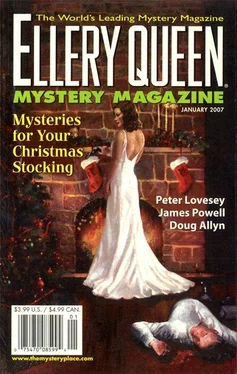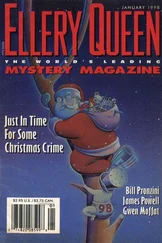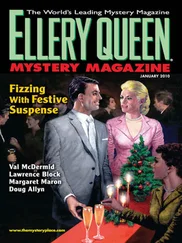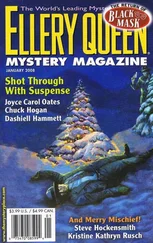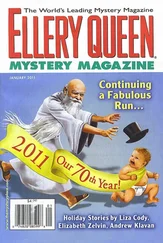Doug Allyn - Ellery Queen's Mystery Magazine. Vol. 129, No. 1. Whole No. 785, January 2007
Здесь есть возможность читать онлайн «Doug Allyn - Ellery Queen's Mystery Magazine. Vol. 129, No. 1. Whole No. 785, January 2007» весь текст электронной книги совершенно бесплатно (целиком полную версию без сокращений). В некоторых случаях можно слушать аудио, скачать через торрент в формате fb2 и присутствует краткое содержание. Город: New York, Год выпуска: 2007, ISBN: 2007, Издательство: Dell Magazines, Жанр: Детектив, на английском языке. Описание произведения, (предисловие) а так же отзывы посетителей доступны на портале библиотеки ЛибКат.
- Название:Ellery Queen's Mystery Magazine. Vol. 129, No. 1. Whole No. 785, January 2007
- Автор:
- Издательство:Dell Magazines
- Жанр:
- Год:2007
- Город:New York
- ISBN:ISSN 0013-6328
- Рейтинг книги:5 / 5. Голосов: 1
-
Избранное:Добавить в избранное
- Отзывы:
-
Ваша оценка:
- 100
- 1
- 2
- 3
- 4
- 5
Ellery Queen's Mystery Magazine. Vol. 129, No. 1. Whole No. 785, January 2007: краткое содержание, описание и аннотация
Предлагаем к чтению аннотацию, описание, краткое содержание или предисловие (зависит от того, что написал сам автор книги «Ellery Queen's Mystery Magazine. Vol. 129, No. 1. Whole No. 785, January 2007»). Если вы не нашли необходимую информацию о книге — напишите в комментариях, мы постараемся отыскать её.
Ellery Queen's Mystery Magazine. Vol. 129, No. 1. Whole No. 785, January 2007 — читать онлайн бесплатно полную книгу (весь текст) целиком
Ниже представлен текст книги, разбитый по страницам. Система сохранения места последней прочитанной страницы, позволяет с удобством читать онлайн бесплатно книгу «Ellery Queen's Mystery Magazine. Vol. 129, No. 1. Whole No. 785, January 2007», без необходимости каждый раз заново искать на чём Вы остановились. Поставьте закладку, и сможете в любой момент перейти на страницу, на которой закончили чтение.
Интервал:
Закладка:
I stood up. “Sorry to have bothered you, Miss Koenig.”
As I turned to go, she asked, “How did you recognize me?”
I hadn’t. My tip-offs had been the birth certificate she’d lied about and her declaration to me that afternoon that she’d die before she told anyone the truth. She hadn’t sounded like a clapped-out guardian then. She’d sounded like a mother.
But I played along. “I’ve seen your footprints in cement, remember? I’d know those size sixes anywhere.”
She smiled for the first time in our acquaintance. The smile curled at the ends, just like it had when the world was young.
Copyright ©2006 by Terence Faherty
Candy Cane Wars
by James Powell

James Powell’s latest Christmas story for us is a tale of espionage behind enemy lines and the threat of biological warfare. As always, elements of the story can be traced to interesting bits of information the author has picked up over the years. For instance, “just before or during World War I,” he tells us, “there was an English music hall song about Gilbert the Filbert, the Kernel of the Nuts.” (This story’s Colonel De Filbert!)
Near midnight, with a light rain falling, the tall officer in military greatcoat and plumed shako entered the ruined village just behind the lines. Gilbert de Filbert, colonel of the Nutcrackers, quickly found the estaminet he was looking for in the cellar of a ruined cottage. A small horseless caravan with “Porcupine Brothers Circus” emblazoned across its canvas side stood near the steps down to the entrance.
The colonel paused for a moment to turn his weary, lantern-jawed face skyward, wondering again why it was always bad weather and Christmas Eve when the Mouse King’s gray minions and his Ratavian allies faced the soldiers of Toyland in the trenches. Then he went down into the smoky, low-ceilinged cellar.
A sharp-eyed, sharp-nosed, stubble-faced hedgehog behind the bar polished a questionable glass with a dubious rag.
Beyond the few empty tables a fire burned in the fireplace. A booth stood in either chimney corner. In one sat a solitary figure hidden in a hooded moleskin cape. In the other, five wooden soldiers whose faded and chipped paint marked them as veterans of the Candy Cane Wars laughed and drank with a jolly, if shopworn, nest of matryoshka dolls.
De Filbert slung his military greatcoat across the bar and set his shako on top of it. When he’d stroked the rain from his fierce moustache, he pointed to a bottle. Then he complained, “Landlord, this place stinks of mouse.”
“Well, now, it would have to, wouldn’t it, Colonel?” replied the hedgehog, bringing the bottle and a glass. “The Mouse King’s people occupied this sector for a long time, didn’t they?”
“Vermin,” said the nutcracker, downing his drink and making a face to match his moustache.
As the owner refilled his glass, the colonel nodded disapprovingly at the floor. “A bar floor without sawdust is like a Christmas tree without tinsel,” he complained again.
The hedgehog shrugged. “There’s a war on, in case you hadn’t heard.” He moved away to resume his dubious polishing.
The colonel grunted to himself. For some reason or another this year’s batch of war shortages included sawdust and kriskringlite, the rare ore Christmas tinsel was made from.
He planted his back against the bar and looked around the room again, noticing for the first time the table under the staircase where a fat porcupine in a thick quill overcoat with long coattails brooded into a mug of lager. A tall ringmaster’s hat lay on the table at one porcupine elbow and a heavy brass caravan key at the other. Horseless caravans were wind-up things based on music-box technology.
De Filbert guessed that Mr. Porcupine there had tired of the main roads with their bothersome military police checkpoints and heavy traffic of fresh wooden soldiers moving toward the Front and turned off here to refresh himself.
Yes, thanks to the switch to wooden soldiers and the assembly lines of Toyland, the army of the Rodent Alliance was now outnumbered in the field. Earlier toy soldiers had been lead, until they started dying off as if there was something in their drinking water or the pipes it came in. So the powers that be had gone to tin. Though steadfast enough, tin soldiers tended to come out of the molding process missing one limb or another, more suited to hook-and-peg work along pirate lines than soldiering.
So they turned to wood. And wood had worked out. Thank God, for the stakes were high. It would be a disaster for humankind if Toyland lost the war. The toy, as they say, is father to the man. Humans remember more of old playthings than they realize. Know it or not, poets hone a toy’s merest musings to craft their verse; novelists quarry toy dreams and adventures to plot their stories; philosophers turn toy platitudes into eternal verities.
Now for the business at hand. Tossing his greatcoat over his shoulder, De Filbert threw a bright play-money bill on the bar, picked up his shako and drink, and crossed the room.
The porcupine raised his head to peer at him through thick eyeglasses as he passed.
Sliding into the booth across from the hooded figure, the colonel murmured, “Herr von Rat, I presume.”
A high-pitched whisper corrected him. “Ratte, it rhymes with latte. Richthofen von Ratte.”
The nutcracker raised a wooden eyebrow. He’d been sent there by Toy Military Intelligence to make contact with its most valuable agent. He had expected a gruff Ratavian accent, not something you might hear from behind a baseboard. Still, what did it matter? The Rodent Alliance was doomed. Starvation stalked the Kingdom of Mouse and, to quote a New Toyland Times headline, “Rat Riots Roil Ratisbon.” No wonder rodents were deserting the sinking ship.
“You are late, Colonel de Filbert,” said Von Ratte.
Yes, he was late. The colonel might have answered that all ruined villages look alike. But he hated traitors even more than he hated rodents. So he said, “At night all cats are black.” Talk of cats always took the wind out of mice.
Von Ratte knew what he was up to. “I am not a mouse,” he squeaked, giving each word equal weight. “I am, in some fashion or other, supposed to be a rat.” Here he opened his cape and raised his hood, revealing a face more shimmer than substance, like moonlight slow-dancing across dark waters. Ratlike, yes, but with large roundish ears, blank disks for eyes through which he somehow saw. He wore lederhosen over a black body stocking.
Lederhosen made the colonel think of Switzerland. So he asked, “You some kind of wind-up cuckoo-clock Johnny? Or one of those fancy new marionettes, the what-do-you-call-’em, the Geppetto Wireless?”
“I’m a toy just like you,” Von Ratte squeaked.
The colonel thought his companion gave off a smell of warm celluloid mixed with buttered popcorn when out of temper.
Von Ratte continued, “Those jack-in-the-boxes at Military Intelligence wanted some kind of a magic-lantern thing who could pass for a rat. Well, R and D botched the job big time. So here I am. Oh, the rat recruiters signed me up all right. But they thought I looked so funny they made me entertainment officer.”
Here the face inside the hood winced as though in pain and then dimmed wearily. Von Ratte put a three-fingered glove to his temple. “R and D tried to correct the royal hash they’d made of things by hoisting me up into an electrical storm in a box kite with bolts attached to my neck,” he explained. “I am no stranger to headaches, Colonel.”
Читать дальшеИнтервал:
Закладка:
Похожие книги на «Ellery Queen's Mystery Magazine. Vol. 129, No. 1. Whole No. 785, January 2007»
Представляем Вашему вниманию похожие книги на «Ellery Queen's Mystery Magazine. Vol. 129, No. 1. Whole No. 785, January 2007» списком для выбора. Мы отобрали схожую по названию и смыслу литературу в надежде предоставить читателям больше вариантов отыскать новые, интересные, ещё непрочитанные произведения.
Обсуждение, отзывы о книге «Ellery Queen's Mystery Magazine. Vol. 129, No. 1. Whole No. 785, January 2007» и просто собственные мнения читателей. Оставьте ваши комментарии, напишите, что Вы думаете о произведении, его смысле или главных героях. Укажите что конкретно понравилось, а что нет, и почему Вы так считаете.
